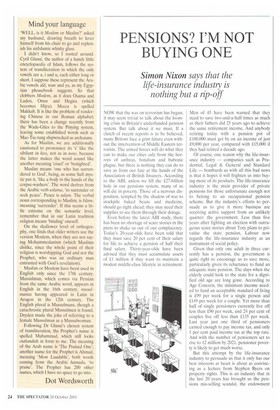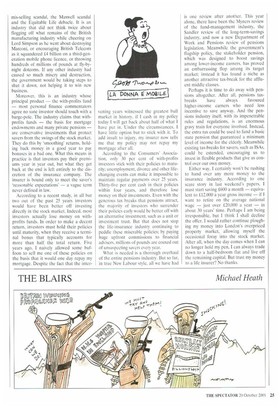PENSIONS? I'M NOT BUYING ONE
Simon Nixon says that the
life-insurance industg is nothing but a rip-off
NOW that the war on terrorism has begun, it may seem trivial to talk about the looming crisis in Britain's underfunded pension system. But talk about it we must. If a clutch of recent reports is to be believed, many Britons face a grim future even without the intervention of Middle Eastern terrorists. The armed forces will do what they can to make our cities safe from the horrors of anthrax, botulism and bubonic plague, but there is nothing they can do to save us from our fate at the hands of the Association of British Insurers. According to the ABI, unless we fill the 127-billion hole in our pensions system, many of us will die in poverty. Those of a nervous disposition, tempted by the shadow of war to stockpile baked beans and medicine, should go right ahead: they may need their supplies to see them through their dotage.
Even before the latest ABI study, there has been no shortage of scare stories in the press to shake us out of our complacency. Today's 20-year-olds have been told that they must save 20 per cent of their salary for life to achieve a pension of half their final salary. Thirty-year-olds have been advised that they must accumulate assets of £1 million if they want to maintain a modest middle-class lifestyle in retirement. Men of 45 have been warned that they need to save two-and-a-half times as much as their fathers did 25 years ago to achieve the same retirement income, And anybody retiring today with a pension pot of £100,000 must get by on an income of just /9,000 per year, compared with £15,000 if they had retired a decade ago.
Of course, one reason why the life-insurance industry — companies such as Prudential, Legal & General and Standard Life — bombards us with all this had news is that it hopes it will frighten us into buying more of its products. The life-insurance industry is the main provider of private pensions for those unfortunate enough not to belong to an occupational pension scheme. But the industry's efforts to persuade us to give it more business are receiving active support from an unlikely quarter: the government. Less than five years after fighting an election with outrageous scare stories about Tory plans to privatise the state pension, Labour now regards the life-insurance industry as an instrument of social policy.
Given that only one adult in three currently has a pension, the government is quite right to encourage us to save more, particularly given its reluctance to fund an adequate state pension. The days when the elderly could look to the state for a dignified old age are long gone. According to Age Concern, the minimum income needed to fund an acceptable standard of living is £99 per week for a single person and £149 per week for a couple. Yet more than half of single pensioners currently live off less than £90 per week, and 24 per cent of couples live off less than 1135 per week. Last year just one third of pensioners earned enough to pay income tax, and only 1 per cent paid income tax at the top rate. And with the number of pensioners set to rise to 12 million by 2021, pensioner poverty is likely to get much worse.
But this attempt by the life-insurance industry to persuade us that it only has our best interests at heart is about as convincing as a lecture from Stephen Byers on property rights. This is an industry that in the last 20 years has brought us the pensions mis-selling scandal, the endowment
mis-selling scandal, the Maxwell scandal and the Equitable Life debacle. It is an industry that did not think twice about flogging off what remains of the British manufacturing industry while cheering on Lord Simpson as he went about destroying Marconi, or encouraging British Telecom as it squandered £4 billion on a third-generation mobile phone licence, or throwing hundreds of millions of pounds at fly-bynight dotcoms. If any other industry had caused so much misery and destruction, the government would be taking steps to shut it down, not helping it to win new business.
Moreover, this is an industry whose principal product — the with-profits fund — most personal finance commentators agree no sane investor should touch with a barge-pole. The industry claims that withprofits funds — the basis for mortgage endowments and many private pensions — are conservative investments that protect savers from the swings of the stock market. They do this by 'smoothing' returns, holding back money in a good year to pay bonuses in a bad one, What this means in practice is that investors pay their premiums year in year out, but what they get back at the end is left entirely to the discretion of the insurance company. The insurer is bound only to meet the saver's 'reasonable expectations' — a vague term never defined in law.
According to a recent study, in all hut two out of the past 25 years investors would have been better off investing directly in the stock market. Indeed, most investors actually lose money on withprofits funds. In order to make a decent return, investors must hold their policies until maturity, when they receive a terminal bonus that typically accounts for more than half the total return. Five years ago. I naively allowed some buffoon to sell me one of these policies on the basis that it would one day repay my mortgage. Despite the fact that the inter vening years witnessed the greatest bull market in history, if I cash in my policy today I will get hack about half of what I have put in. Under the circumstances, I have little option but to stick with it. To add insult to injury, my insurer now tells me that my policy may not repay my mortgage after all.
According to the Consumers' Association, only 30 per cent of with-profits investors stick with their policies to maturity; unemployment, divorce and other lifechanging events can make it impossible to maintain regular payments over 25 years. Thirty-five per cent cash in their policies within four years, and therefore lose money on their investments. Even with the generous tax breaks that pensions attract, the majority of investors who surrender their policies early would be better off with an alternative investment, such as a unit or investment trust. But that does not stop the life-insurance industry continuing to peddle these miserable policies; by paying huge upfront commissions to financial advisers, millions of pounds are coaxed out of unsuspecting savers every year.
What is needed is a thorough overhaul of the entire pensions industry. But so far, in true New Labour style, all we have had is one review after another. This year alone, there have been the Myners review of the fund-management industry, the Sandler review of the long-term-savings industry, and now a new Department of Work and Pensions review of pensions legislation. Meanwhile the government's flagship policy, the stakeholder pension, which was designed to boost savings among lower-income earners, has proved an embarrassing flop among its target market; instead it has found a niche as another attractive tax-break for the affluent middle classes.
Perhaps it is time to do away with pensions altogether. After all, pensions tax
breaks have always favoured higher-income earners who need less incentive to save anyway. And the pensions industry itself, with its impenetrable rules and regulations, is an enormous gravy train for everyone involved. Instead, the extra tax could be used to fund a basic state pension that guaranteed a minimum level of income for the elderly. Meanwhile existing tax-breaks for savers, such as ISAs, could be extended, encouraging us to invest in flexible products that give us control over our own money.
Either way, I certainly won't be rushing to hand over any more money to the insurance industry. According to one scare story in last weekend's papers, I must start saving £600 a month — equivalent to £12.000 a year gross income — if I want to retire on the average national wage — just over £20,000 a year — in about 30 years' time. Perhaps I am being irresponsible. but I think I shall decline the offer. I would rather continue ploughing my money into London's overpriced property market, allowing myself the occasional foray into the stock market. After all, when the day comes when I can no longer hold my pen, I can always trade down to a half-bedroom flat and live off the remaining capital. But trust my money to a life insurer? No thanks.



























































































 Previous page
Previous page